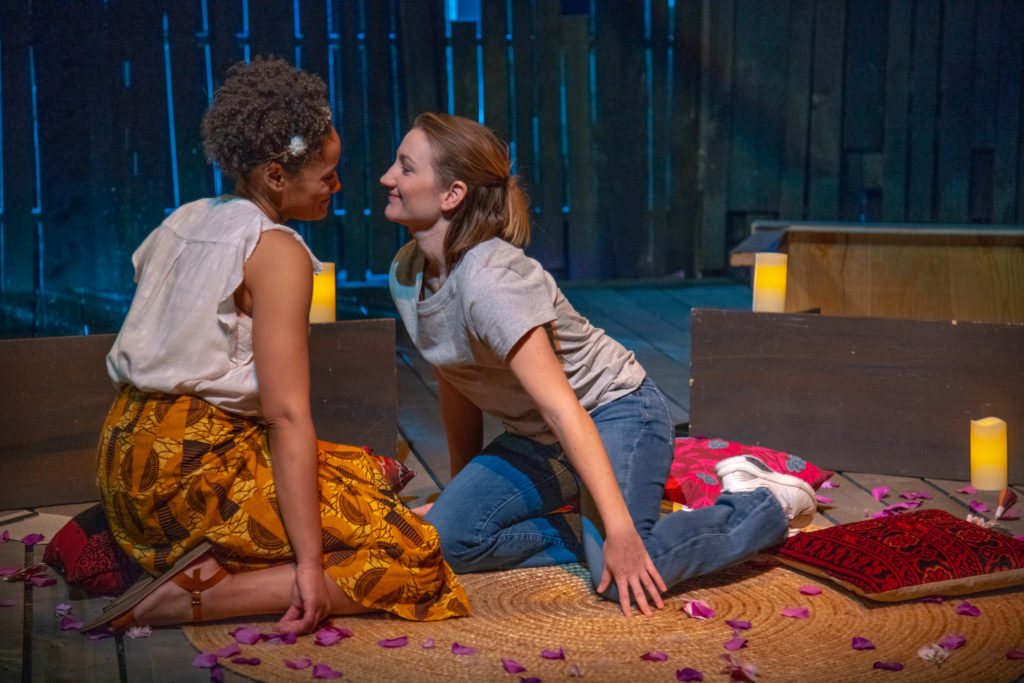
Photo by Andrew Brilliant/Brilliant Pictures; L-R: Rachel Cognata and Marge Dunn.
Presented by New Repertory Theatre
Written by Hansol Jung
Directed by Benny Sato Ambush
March 23 —April 14, 2019
The Dorothy and Charles Mosesian Center for the Arts
321 Arsenal St
Watertown, MA 02472
New Rep on Facebook
Critique by Diana Lu
(Watertown, MA) Cardboard Piano is a two-part sociopolitical drama. The first act portrays a young love affair between Chris, a missionary’s daughter (Marge Dunn), and Adiel (Rachel Cognata), a Ugandan teenager, and how it was torn apart by senseless homophobia and war violence. The second act sees the daughter return to Uganda 15 years later to find the man who killed her lover (Michael Ofori/Marc Pierre) reviving her father’s church and continuing to oppress his young, queer congregants.
The story of the Cardboard Piano goes like this: One time, when Chris was very young, she wanted a piano, but her dad couldn’t afford it and instead made her a small piano out of cardboard. She ripped it up, but her dad fixed it. The moral is, there’s nothing that love can’t fix. Especially for a situation in which religious oppression and ongoing war tear Uganda (and Chris’s relationships) apart, that framework seems hopelessly naïve.
Some things, like war and death, just can’t be fixed. Likewise, nothing, not brilliant acting, direction, or staging, can make up for a script that just isn’t quite there. From Chris telling the cardboard piano story to a child solider who minutes before held a gun to her held to the way it became a motif revisited over and over, Jung’s writing feels emotionally immature and structurally amateurish. I think it’s because Jung was writing with a lot of lofty intentions, but without really knowing the people she’s writing about. The characters all seem like concepts or archetypes, not real human beings.
Each character was more like an archetype than a real person. It was like watching a bunch of REPRESENTATIVES of humans being interact, rather than watching a series of human relationships unfold. How the characters are presented and how they relate to each other comes across as disingenuous, inorganic, forced. Rachel Cognata and Michael Ofori were by far the best players. I’m not sure if it’s just because they had the characters with the most range, but the other two, especially Chris just seemed to stand there like two-dimensional stand-ins of real people. It was like they didn’t have their own motivations.
Adiel had some cringey lines mail-order bride-like lines, such as “I love it when you speak my language,” and “in my country we need to know more than how to make pretty things.” Really Adiel? In your country? The one you and Chris are both in right now? Who talks like that? It’s like Jung modeled the dialogue from some backward white savior movie from the 90’s. Furthermore, how did these two even get together? Why are they so divergent in their idea of how this “wedding” is supposed to go, and what will happen afterward? Haven’t they even talked about it? All of it just seems preposterous.
Jung writes the superficial details well, but there doesn’t seem to be any depth or nuance to her characters. She also writes close interpersonal interactions well, like for the most part, the dialogue between Adiel and Chris, and especially between Ruth and Paul, felt warm, genuine, and engrossing. The banter between Ruth and Paul in Act 2 was charming, hilarious, and heartwarming to watch. The problem was, none of this was relevant to the dramatic action of the play. Each time the drama was carried out by circumstance, essentially a deus ex machina entrance, not motivated by the characters themselves. The primary dramatic action also occurs between STRANGERS who don’t know or care about each other except in the most vague, humanist ways, so already there is not a lot of tension or interest.
Much of the second act was taken up by an extended argument between four different people, all with unique point of views. It is extremely difficult to carry out a group scene with more than two points of view, it just gets too muddled, and no one knows what’s going on, especially in a high-stakes screaming match. Unless you’re JS Bach, don’t write a four-part invention. The stage picture was just a group of people screaming at each other incoherently. It was impossible to pick out the individual perspectives of each character, and because of that, the scene wasn’t able to sustain any tension for Paul’s soliloquy to break. What could have been a powerful climax just ended up as more incoherent screaming from a character the audience lost interest in five minutes before. Maybe there’s too much going on for the audience to follow one crisis after another, or just the fact that so many strangers come in and go. It just seems like Jung is trying to say too much, and ends up saying nothing.
Also, IF THERE WAS EVER A GOOD TIME TO CAST A DARK-SKINNED BLACK WOMAN NOW WOULD HAVE BEEN IT. The woman who played Adiel/Ruth did marvelous work embodying her characters, and this critique is certainly not to impugn her performance. But CASTING DIRECTORS NEED TO ADDRESS COLORISM.
I did appreciate that Jung was thoughtful and balanced in her portrayal of a complicated and difficult subject. Her intentions much exceeded my expectations in terms of what it was trying to say. Unfortunately, the execution just couldn’t quite express her ideas coherently. Ultimately, Cardboard Piano is sort of like a cardboard piano: a flimsy attempt at a beautiful gesture that didn’t end up satisfying anyone.
